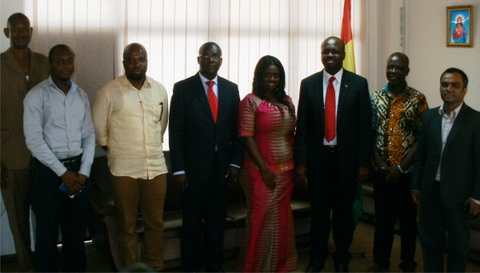
The Ghana Internet Service Providers Association (GISPA) has asked Government to strongly consider waiving taxes on modems used to access the Internet, otherwise known as terminal equipment.
According to GISPA, whose membership comprises all firms authorised to provide Internet services to homes and offices, taking taxes off Customer Premises Equipment, access modems, dongles, among others, will help to reduce the cost of entry into the Internet sector and improve the Internet access rate in the country.
GISPA made the appeal in Accra when members of the association called on the Minister of Communication Edward Omane Boamah, and his deputy, Victoria Lakshmi Hamah, to offer their support to the newly-appointed duo mandated to lead the formulation and implementation of policies to guide growth in the communication sector.
The Internet Service Providers’ appeal for taxes on access modems to be removed mirrors Government’s previous decision to waive import duties on mobile voice access devices, specifically mobile phones, which has helped to shoot-up access to mobile phone telephony services and subscription rates.
“As part of efforts to improve Internet usage in this country, we are faced with the issue of taxes on terminal equipment. If you take the mobile network operators, there are no taxes on their devices.
“But when it comes to purely Internet service provision, we pay huge taxes on the equipment that the users are going to use. One of the reasons why growth in the Internet services sector has not really reached the level we want is that the cost of entry is always high.
“We are looking to work with you so that we can look at some of these taxes, and make sure that we get more users to have Internet access to reduce the cost of entry,” said the President of GISPA, Ernest Brown.
The Minister of Communication, Edward Omane Boamah, said Government sees the Internet industry as a critical sector needed to empower people and improve economic activities, and will always support private sector interventions that enhance access to technology services.
“In terms of subscription to mobile telephony, the figures are way ahead of the use of Internet in Ghana, which is why Government will always engage the sector to provide essential services to people.”
He said the need to increase Internet access also raises a new challenge as to how to realign revenue generation without cutting Government’s source of revenue for development.
He said Government is aware of the unhealthy and strained relationship between ISPs and traditional voice network operators, and has arranged to meet the Ghana Telecom Chamber to help ensure that the work of the two parties is complementary and in tandem with each other for betterment of the industry.
According to the International Telecommunication Union (ITU) report for last year, the Internet user population of the country is now 14 percent, which suggests that one in seven Ghanaians now has access to the Internet, an improvement over what used to pertain in the country two years ago when only one out of 10 Ghanaians had access to the Internet.
The Internet penetration rate in the country, however, is far off the more than 100 percent penetration rate recorded in the voice telephony sector.
Some analysts argue that the penetration rate of the country could be higher than the 14 percent reported by the ITU, as more people now access the Internet on their mobile phones in areas where fixed or wired Internet subscription is non-existent.
According to the ITU, the country’s performance in the Internet sector last year has placed Ghana as the 15th-best country in Africa in terms of Internet users per population.
Ghana, which was the first country in sub-Saharan Africa to pioneer Internet usage in homes and offices in 1993, now falls behind countries like Seychelles, Mauritius, South-Africa, Cape Verde, Botswana, Namibia, Gabon, Kenya, Zimbabwe, and Swaziland.
Industry players have thus called for regulatory and policy interventions to propel growth in Internet usage, as the entry of international bandwidth providers has helped to bring down by about half the cost of accessing Internet services in the country — resulting in enhanced Internet user-experience.

